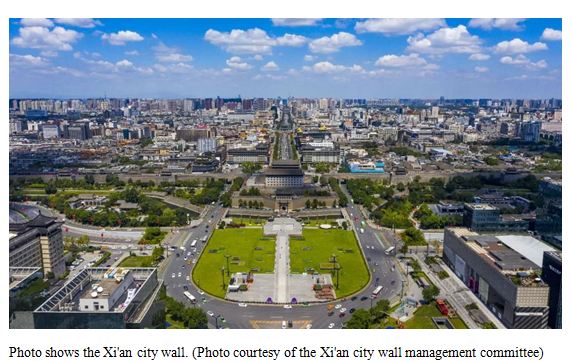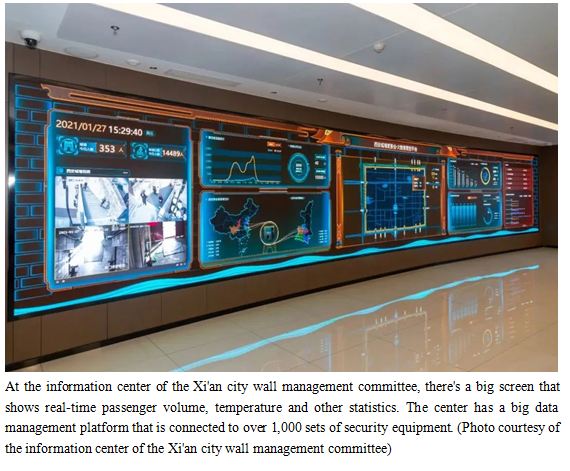By Yuan Taoxiong, People’s Daily
Digital technology-assisted conservation of ancient city wall in Xi’an, northwest China’s Shaanxi province, was recently listed among the top-10 cases of digital innovation in the Chinese culture and tourism industry of 2022.
Assisted by digital technologies, the ancient city wall in the Chinese city is showing its attractiveness in more diverse aspects.
The ancient ramparts trace back to more than 1,400 years ago. As the city develops, they are now surrounded by busy commercial districts, and there are metro lines that cross them underground.
The conservation of the city wall is about not only the wall itself but also its wooden annexes and the city moat. Today, the digital technologies that are employed to protect the city wall are like sentries that never feel fatigue.
On the path over the Yongning Gate, the south gate of the ancient city wall, there are three small cylinders every few dozens of meters.

“They are vertical in-place inclinometers, which are able to precisely monitor the horizontal displacement of the inner wall of the barbican at the gate,” said Xie Zhiyuan, who works for the management committee of the Xi’an city wall.
According to Xie, devices are installed in all sections of the city wall that stretches 13,74 kilometers to monitor the safety of the wall and annexes.
“We have designated 31 underwater monitoring sites along the moat and set up vibration monitoring points at the gates that metro lines cross. These digital devices offer massive data and lay a solid foundation for targeted conservation of the city wall,” said Gao Heng, head of the cultural relics preservation and tourism department of the Xi’an city wall management committee.
Based on the data collected by the devices, the management committee built a warning system that sets four warning thresholds for the settlement and cracking of the city wall, Gao told People’s Daily, adding that response measures will be taken according to different levels of warning.
From adopting simplistic and palliative approaches to taking preventative measures, Xi’an’s city wall conservation has gone through fundamental transformation with the assistance of digital and information technologies, Gao said.
“We’ll further exploit 3D-scanning and automatic monitoring technologies to extend the life of the city wall,” Gao noted.
“It’s so high,” shouted tourist Zhao Yan, wearing a virtual reality (VR) headset and closely holding the hands of her friend. A drone had already flown far outside the glass ceilings above her head and begun filming the magnificent view of the city wall from above.
Apart from bikes, electric bikes, and rowing boats, VR drones have expanded the optionsfor sightseeing along the city wall.
According to an employee of the city wall scenic area, the drones are remotely controlled by a cloud platform and very popular among tourists.
At the information center of the Xi’an city wall management committee, there’s a big screen that shows real-time passenger volume, temperature, and other statistics. The center has a big data management platform that is connected to over 1,000 sets of security equipment, which are able to monitor cultural relics preservation, record passenger flow, and perform other monitoring tasks.
“It’s necessary to upgrade cultural and tourism resources with digital means. Intelligent transformation of scenic spots brings newer experiences to tourists and makes management more efficient,” said Su Ning, general manager of Xi’an Qujiang City Wall Tourism Development Company Ltd.
Today, the development of online museums is creating opportunities for tourists who cannot make in-person visits.
A relics museum near the Hanguang Gate of the Xi’an city wall has made a digital replica of itself in a mini program based on 3D data capture. It also developed a H5 game that has aroused the interest of many children in the city wall.
“Novel digital cultural products can better enhance the public’s sense of identity for and pride in traditional culture. We’ll keep working to find what tourists like based on digital information and better promote and display cultural relics with digital technologies,” Gao said.

















